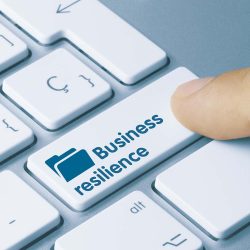20% of new businesses in the UK do not make it past the first year, and 60% will fail within the first three years [1]. So, what separates the businesses that thrive from those that don’t?
The answer is simple: resilience.
The past few years have been a testament to this, with the pandemic, Brexit, and economic recessions reshaping the way we operate. While some businesses struggled to keep their doors open, others adapted and emerged stronger, and that’s because they had built business resilience to prepare them for the unexpected, rainy days.
If you want to build a resilient business, one that is as “future-proof” as it could be, here is our advice.
What is business resilience?
Business resilience is about being ready for the unexpected. It’s the ability of your business to foresee potential hurdles, prepare for them, respond effectively when they strike, and adapt to ensure not just survival, but continued growth.
Business resilience vs business continuity
It’s easy to confuse business resilience with business continuity, but there’s a subtle yet significant difference.
- Business continuity is ensuring operations run smoothly despite hurdles. Imagine a power outage; your continuity plan ensures that the lights stay. For example, a retail store might have an emergency protocol to switch to manual billing during a system failure, ensuring sales continue uninterrupted.
- Business resilience is the broader strategy. For instance, a resilient business might use a prolonged power outage as an opportunity to develop an innovative, energy-efficient system that not only addresses the current problem but also improves future operations.
9 ways to increase business resilience
- Risk management: It’s crucial to identify and mitigate potential risks before they become problems. Implementing robust risk management strategies can safeguard your business against unforeseen events.
- Diversify revenue streams: Don’t put all your eggs in one basket. Reducing dependency on a single source of income can make your business more resilient in fluctuating markets.
- Monitor financial metrics: Keep a vigilant eye on cash flow, expenses, and other key financial indicators. Understanding your financial health is essential for making informed decisions.
- Invest in technology: Embrace digital tools and automation. They’re not just about efficiency; they’re about staying agile and adaptable in a rapidly evolving business landscape.
- Develop a strong team: Cultivate a culture of adaptability and problem-solving. A resilient team can be your greatest asset in navigating challenges.
- Build strong relationships with suppliers and customers: A reliable supply chain and loyal customer base are pillars of resilience. Nurture these relationships to ensure stability and growth.
- Plan for different scenarios: Hope for the best, but prepare for the worst. Having contingency plans for various potential disruptions can keep you a step ahead.
- Regularly review and update your business plan: The only constant in business is change. Regularly revisiting and updating your business plans ensures you remain relevant and responsive.
- Invest in employee training and development: Equip your team with the skills and knowledge to adapt to new challenges. An empowered workforce is key to a resilient business.
Don’t fail to prepare
If you want to be the business that doesn’t become a failure statistic; if you want to be the business that thrives in the face of change and challenge, start prioritising building your business resilience using these strategies above.
Need help preparing for those rainy days?
From business planning and goal planning to financial analysis and forecasting, we can help you build a resilient business while also putting money aside for a rainy day. Get in touch to find out how we can help you.
